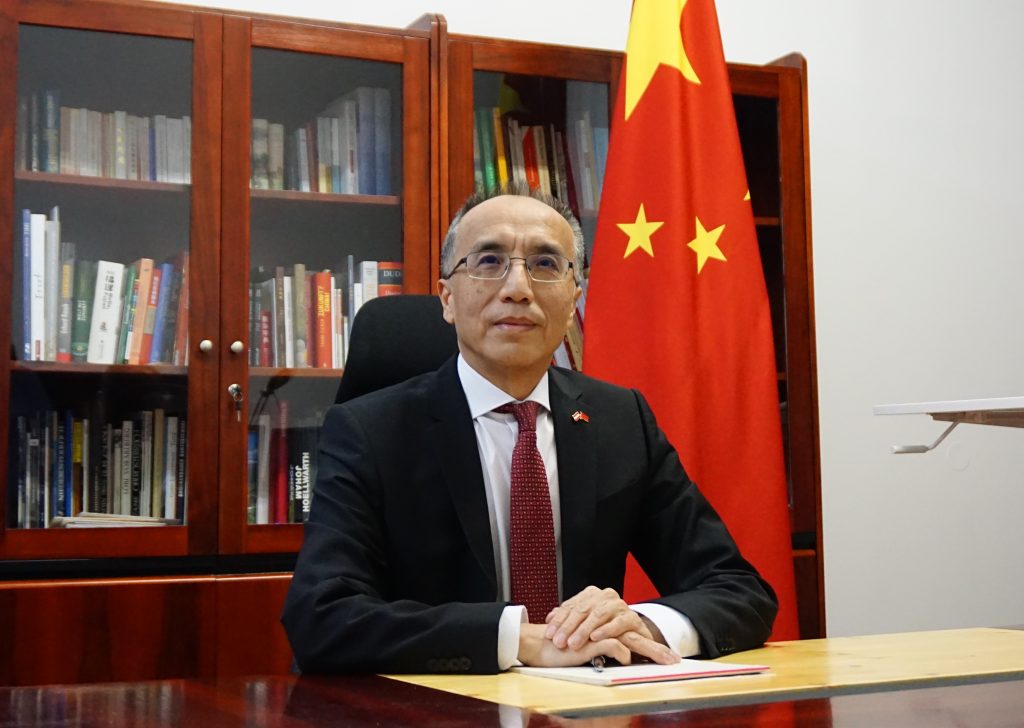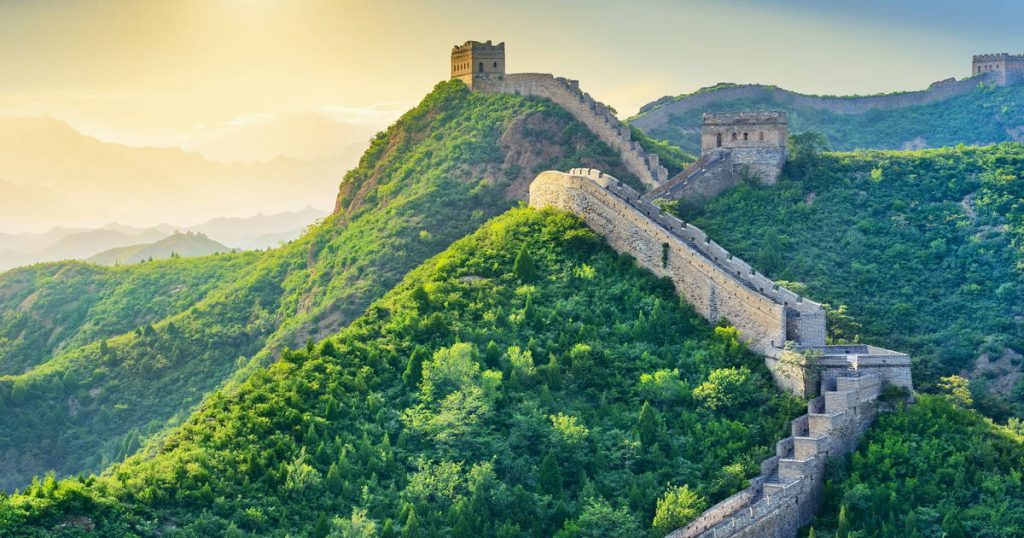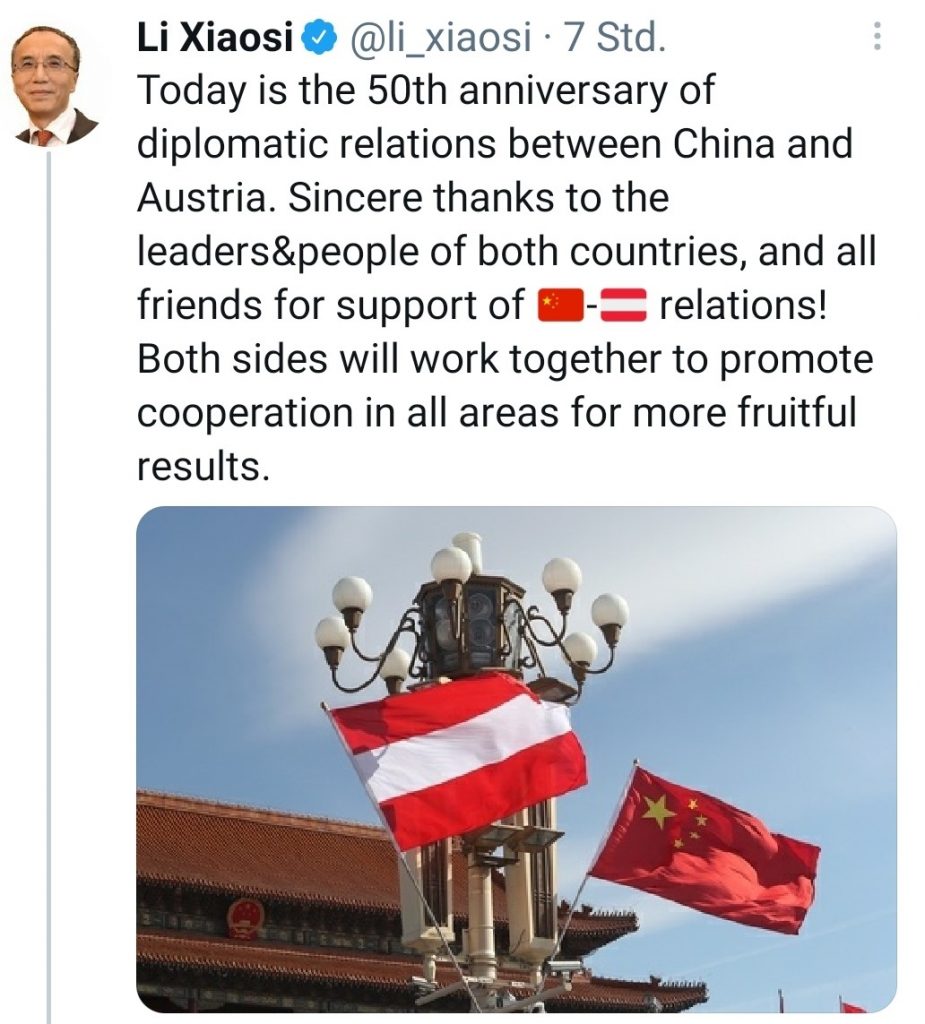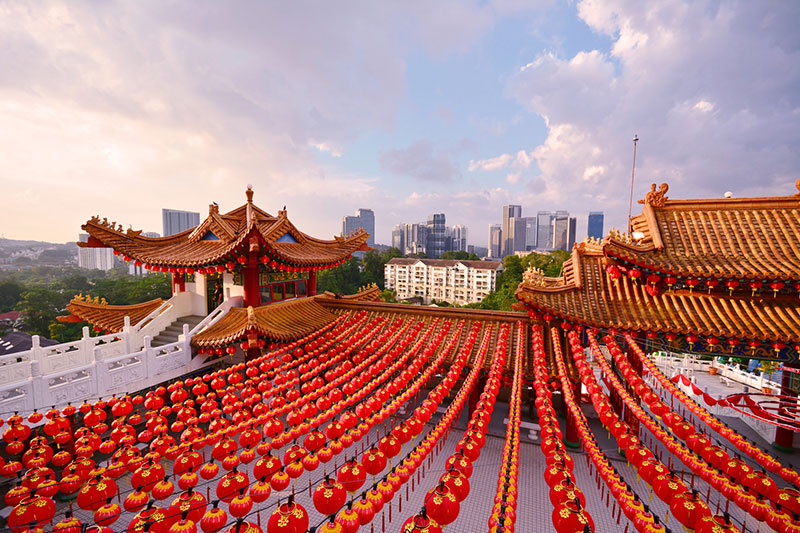
Die Belt & Road-Initiative wird von immer mehr Ländern begrüßt und unterstützt und wird sicherlich eine größere Entwicklung in der Zukunft erleben
Im Mai dieses Jahres waren es genau 50 Jahre seit der Aufnahme diplomatischer Beziehungen zwischen China und Österreich.
Dieses große Jubiläum war Anlass für das Magazin Diplomacy and Commerce Austria, mit dem geehrten Botschafter S.E. Xiaosi Li über die diplomatischen Beziehungen zwischen China und Österreich zu sprechen sowie über die Wirtschaft Chinas, die immer häufiger als Wirtschaftstiger bezeichnet wird, sowie über Tweets von Botschafter Li und die Pandemie und ihre Folgen.
Geehrter Botschafter Li, in diesem Jahr jährt sich zum 50. Mal die Aufnahme diplomatischer Beziehungen zwischen China und Österreich. Können Sie uns sagen, wie diese Beziehungen heute aussehen, und besteht, Ihrer Meinung nach, die Möglichkeit, sie noch zu intensivieren?
Die chinesisch-österreichischen Beziehungen haben sich in den vergangenen 50 Jahren gut entwickelt. 2018 stattete Bundespräsident Alexander Van der Bellen in Begleitung von Bundeskanzler Sebastian Kurz China einen Staatsbesuch ab, und unsere Beziehungen wurden auf die Ebene einer freundschaftlichen strategischen Partnerschaft angehoben. 2019 besuchte Bundeskanzler Kurz China nochmals und der Vorsitzende des Ständigen Ausschusses des Nationalen Volkskongresses der VR China, LI Zhanshu, war auch in Österreich zu Besuch. Das bilaterale Handelsvolumen ist seit der Aufnahme diplomatischer Beziehungen mehr als 400-fach erhöht. Nun ist China Österreichs viertgrößter Handelspartner weltweit. Auch gastieren die Wiener Philharmoniker, die Wiener Symphoniker sowie die Wiener Sängerknaben regelmäßig in China. Für chinesische Künstlergruppen ist Österreich immer eine beliebte Destination. Derzeit bestehen 20 Städte- und Regionenpartnerschaften. 2019 gab es zwischen beiden Ländern vier Direktflüge, 1,03 Millionen chinesische Touristen besuchten Österreich. Im Kampf gegen die Corona-Pandemie haben sich beide Länder gegenseitige Unterstützung gewährt und ausgezeichnet zusammengearbeitet. Die traditionell gute Freundschaft hat sich in der Krise bewährt. Mit dem Beginn der Umsetzung des 14. Fünfjahresplans sowie der langfristigen Ziele bis zum Jahr 2035 wird sich ab heuer Chinas Wirtschaft weiterhin stabil und schnell entwickeln, was allen Ländern der Welt einschließlich Österreich neue Chancen bietet. Neben traditionellen Bereichen können beide Länder die Zusammenarbeit bei der Digitalwirtschaft, grüner Entwicklung, Belt &; Road-Initiative (BRI) sowie Olympischen Winterspielen in Beijing vertiefen bzw. ausbauen.

Gibt es Pläne, dieses wichtige Jubiläum in Österreich zu feiern, und wird es kulturelle Veranstaltungen geben, die dieses Jubiläum sowohl in China als auch in Österreich begleiten?
Am 28. Mai haben Chinas Staatspräsident Xi Jinping und der österreichische Bundespräsident Alexander Van der Bellen, Ministerpräsident Li Keqiang und Bundeskanzler Sebastian Kurz bzw. Außenminister Wang Yi und Bundesminister Alexander Schallenberg Glückwunschbotschaften zum 50. Jahrestag der Aufnahme diplomatischer Beziehungen zwischen beiden Ländern ausgetauscht. Beide Seiten betonten, das 50. Jubiläum zum Anlass zu nehmen, um die Entwicklung unserer Beziehungen kontinuierlich voranzutreiben. Zum 50. Jubiläum fanden auch Dialoge und Austausch in den Bereichen Politik, Wirtschaft, Kultur usw. sowie zwischen den Partnerregionen und -städten statt. Eigentlich haben wir auch eine Reihe von Empfängen, Vorträgen, Konzerten, Ausstellungen und anderen Veranstaltungen geplant. Angesichts der Corona-Pandemie mussten manche davon aber abgesagt oder verschoben werden. Mit der Besserung der Corona-Situation sowohl in China als auch in Österreich ist es zu hoffen, dass einige Veranstaltungen in der zweiten Jahreshälfte planmäßig durchgeführt werden können.
Haben Sie Informationen darüber, wie groß die chinesische Diaspora in Österreich und in Wien ist, und wie sind die Beziehungen, die die Botschaft der Volksrepublik China zu ihren Bürgern hat?
Unserer Einschätzung nach leben zur Zeit ungefähr 30.000 Chinesen in Österreich, davon mehr als die Hälfte davon in Wien. Die Überseechinesen in Österreich haben sich gut in die Gesellschaft integriert und sich stets für die wirtschaftliche und gesellschaftliche Entwicklung Österreichs eingesetzt. Während der Corona-Pandemie haben sie eine große Menge medizinischer Hilfsgüter an österreichische Institutionen gespendet, was einen wertvollen Beitrag zur Förderung der Freundschaft zwischen unseren beiden Völkern war. Die Botschaft hat die chinesischen Staatsbürger in Österreich immer zur Einhaltung der österreichischen Gesetze aufgefordert, und zugleich ihnen notwendige konsularische Hilfe geleistet. Von der österreichischen Regierung sowie von der österreichischen Bevölkerung erhalten die Chinesen in Österreich Anerkennung und Lob.

Sie sind sehr aktiv im sozialen Netzwerk Twitter, wo Sie kürzlich einen Tweet gepostet haben: „Diejenigen, die China dämonisieren, werden am Ende den Preis dafür zahlen, denn wenn sie ihre Argumentation nicht mit Fakten rechtfertigen oder beweisen können, verlieren sie die Glaubwürdigkeit gegenüber den Menschen ihres eigenen Landes und der Welt. Menschen mit einem Sinn für Gerechtigkeit können leicht richtig von falsch unterscheiden“ – Welches Ereignis hat Ihre Reaktion ausgelöst, und wer sind diejenigen, die versuchen, China zu dämonisieren?
Seit einiger Zeit werfen bestimmte Leute im Westen der chinesischen Regierung „Genozid“ und „Zwangsarbeit“ in Xinjiang vor, manche griffen sogar zu Sanktionen. Diese Anschuldigungen basieren jedoch auf reinen Lügen von antichinesischen Separatisten und zielen nur darauf ab, China zu verleumden, sich in die inneren Angelegenheiten Chinas einzumischen und seine Entwicklung zu bremsen. Das lehnen wir entschieden ab. Bei Xinjiang-bezogenen Fragen geht es weder um Menschenrechte noch um ethnische oder religiöse Angelegenheiten, sondern schlichtweg um die Bekämpfung von Terrorismus, Separatismus und Extremismus. In den letzten Jahren ist die chinesische Regierung rechtmäßig gegen gewalttätige und terroristische Aktivitäten in Xinjiang vorgegangen und hat eine Reihe von Deradikalisierungsmaßnahmen ergriffen, die Erfolge erzielt haben. Fakten sprechen mehr als Worte. Einmal sehen ist besser als hundertmal hören. Ohne Glaubwürdigkeit kann man sich nicht behaupten. Mit solch haltlosen Anschuldigungen könnten diejenigen, die China dämonisieren wollen, das Land wohl einigermaßen beeinträchtigen. Schließlich werden sie nur ihre eigene Glaubwürdigkeit bzw. ihren eigenen Ruf im In- und Ausland schädigen.
Haben Sie seit Ausbruch der Corona-Pandemie das Gefühl, dass Sie Ihr Land häufiger und intensiver vor verbalen Angriffen schützen müssen?
Jede Pandemie kann irgendwann und irgendwo auftreten und ist ein gemeinsamer Feind der Menschheit. Als weltweit erstes Land hat China das Virus gemeldet und umgehend die WHO sowie relevante Länder informiert, dazu weiters entschlossene Maßnahmen ergriffen und die Lage binnen kurzer Zeit unter Kontrolle gebracht. Dabei hat China Anteilnahme und Unterstützung von vielen Ländern erhalten, darunter auch von Österreich. Als sich die Pandemie weltweit verbreitete, ist China trotz eigener Schwierigkeiten vielen anderen Ländern zu Hilfe gekommen, was den humanitären Geist durch Solidarität in der Krise zum Ausdruck brachte. Durch ein neuartiges Virus ausgelöst, kann die Corona-Pandemie bei manchen Zweifel hervorrufen, und das ist verständlich. Es ist aber inakzeptabel, dass einige Leute bzw. Länder, die die eigene Corona-Lage nicht in den Griff bekommen konnten, bloß China die Schuld zuweisen oder gar das Virus politisieren, um China zu verleumden bzw. zu attackieren. Die Pandemie ist eine wissenschaftliche Frage und sollte deswegen von Wissenschaftlern untersucht und gelöst werden.

Vor mehr als einem Jahr waren alle Augen auf Wuhan gerichtet. Wie ist die aktuelle Situation in Wuhan, und hat sich das Leben in China wieder vollständig normalisiert?
Wuhan, die Region die letztes Jahr am stärksten vom Coronavirus betroffen war, begann am 23. Januar 2020 mit einem 76-tägigen harten Lockdown. Um die Pandemie so schnell wie möglich einzudämmen, haben die Menschen in Wuhan viel dafür geopfert. Die Erfolgsgeschichte von Wuhan spiegelt den Erfolg Chinas bei der Pandemiebekämpfung wider. Es zeigt den großen Kampfgeist gegen die Pandemie, dass China das Menschenleben über alles stellt, Gefahren trotzt, die Wissenschaft respektiert, eine gemeinsame Zukunft sichert und die Kräfte der ganzen Nation bündelt. Zur Zeit ist die Pandemie sowohl in Wuhan, als auch in anderen Regionen Chinas, effektiv unter Kontrolle gebracht worden, und das wirtschaftliche und gesellschaftliche Leben hat sich in China wieder normalisiert. Momentan werden in China täglich ca. 20 Neuinfektionen gemeldet und davon sind die meisten vom Ausland eingeschleppt.
Aufgrund des wirtschaftlich wachsenden Einflusses und der Bedeutung chinesischer Investitionen im Ausland hat China den Beinamen des Wirtschaftstigers erhalten. Wie hat sich die Corona-Pandemie auf die wirtschaftliche Entwicklung Chinas ausgewirkt, und hat sie Chinas Auslandsinvestitionen und Projekte wie die Neue Seidenstraße beeinflusst?
Seit mehr als 40 Jahren wächst Chinas Wirtschaft rasant. Das Land erlebt eine anhaltende soziale Stabilität. China hat sich zur weltweit zweitgrößten Volkswirtschaft und zugleich zum größten Warenhandelsland, Produzentenland, Devisenreserveland sowie Empfängerland von ausländischen Direktinvestionen entwickelt. In den letzten Jahren sorgte China für 30 Prozent des globalen Wirtschaftswachstums. Trotz Corona schaffte China im vergangen Jahr ein Wachstum von 2,3%. Und im ersten Quartal des laufenden Jahres wuchs Chinas BIP um 18,3%. Das Wachstum von industrieller Wertschöpfung, Einzelhandelsumsatz mit Konsumgütern, Investitionen in Sachanlagen sowie Importen und Exporten von Waren lagen jeweils zwischen 25% und 30%, der Zuwachs von der Nutzung ausländischer Investitionen sogar 40%. Diesbezüglich sind wir voller Zuversicht, das Ziel eines jährlichen Wirtschaftswachstums von mehr als 6% zu erreichen. Nachdem die BRI vor sieben Jahren ins Leben gerufen wurde, hat das Handelsvolumen zwischen China und BRI-Partnerländern mehr als 7,8 Billionen US-Dollar betragen, die Gesamtinvestitionen über 110 Milliarden US-Dollar. 2020 legten die China-Europa-Güterzüge mit einer Steigerung von 50% 12.4069 Fahrten zurück – als eine offene Win-Win-Plattform für die internationale Wirtschaftszusammenarbeit.
English:
The Belt & Road initiative is welcomed and supported by more and more countries and is sure to see greater development in the future
H.E. Xiaosi Li, Ambassador of the People’s Republic of China to the Republic of Austria
In May of this year it was exactly 50 years since the establishment of diplomatic relations between China and Austria.
This big anniversary was the occasion for the magazine Diplomacy and Commerce Austria to speak with the honored Ambassador H.E. Xiaosi Li about the diplomatic relations between China and Austria as well as about the economy of China, which is more and more often referred to as an economic tiger, as well as about tweets from Ambassador Li and the pandemic and its aftermath.
Dear Ambassador Li, This year marks the 50th anniversary of the establishment of diplomatic relations between China and Austria. Can you tell us what these relationships are like today, and do you think there is a chance they can be intensified?
Chinese –Austrian relations have developed well over the past 50 years. In 2018, Federal President Alexander Van der Bellen, accompanied by Federal Chancellor Sebastian Kurz, paid a state visit to China, and our relations were raised to the level of a friendly strategic partnership. In 2019, Chancellor Kurz visited China again and the Chairman of the Standing Committee of the National People’s Congress of the People’s Republic of China, LI Zhanshu, also visited Austria.
The bilateral trade volume has increased more than 400 times since diplomatic relations were established. China is now Austria’s fourth largest trading partner worldwide. The Vienna Philharmonic, the Vienna Symphony and the Vienna Boys’ Choir also make regular guest appearances in China. Austria is always a popular destination for Chinese artist groups. There are currently 20 city and regional partnerships. In 2019 there were four direct flights between the two countries and 1.03 million Chinese tourists visited Austria.
In the fight against the corona pandemic, both countries have given each other mutual support and have worked together excellently. The traditionally good friendship has proven itself in the crisis. With the start of the implementation of the 14th five-year plan and the long-term goals up to 2035, China’s economy will continue to develop steadily and quickly from this year on, which will open up new opportunities for all countries in the world, including Austria. In addition to traditional areas, both countries can deepen or expand their cooperation in the digital economy, green development, the Belt & Road Initiative (BRI) and the Olympic Winter Games in Beijing.
Are there any plans to celebrate this important anniversary in Austria and will there be cultural events to accompany this anniversary in both China and Austria?
On May 28, China’s President Xi Jinping and the Austrian Federal President Alexander Van der Bellen, Prime Minister Li Keqiang and Federal Chancellor Sebastian Kurz and Foreign Minister Wang Yi and Federal Minister Alexander Schallenberg exchanged messages of congratulations on the 50th anniversary of the establishment of diplomatic relations between the two countries. Both sides emphasized that they should use the 50th anniversary as an opportunity to continuously advance the development of our relationships. For the 50th anniversary, dialogues and exchanges in the areas of politics, business, culture, etc. as well as between the partner regions and cities took place. Actually, we have also planned a number of receptions, lectures, concerts, exhibitions and other events. In view of the corona pandemic, some of them had to be canceled or postponed. With the improvement of the corona situation in both China and Austria, it is to be hoped that some events can be held as planned in the second half of the year.
Do you have any information about the size of the Chinese diaspora in Austria and Vienna, and what is the relationship between the Embassy of the People’s Republic of China and its citizens?
We estimate that there are currently around 30,000 Chinese living in Austria, more than half of them in Vienna. The overseas Chinese in Austria have integrated well into society and have always been committed to the economic and social development of Austria. During the corona pandemic, they donated a large amount of medical aid to Austrian institutions, which was a valuable contribution to promoting friendship between our two peoples. The embassy has always urged Chinese citizens in Austria to comply with Austrian laws and at the same time provided them with the necessary consular assistance. The Chinese in Austria receive recognition and praise from the Austrian government and the Austrian population.
You are very active on the social network Twitter, where you recently posted a tweet: “Those who demonize China will pay the price for it in the end, because if they cannot justify or prove their argument with facts, they will lose credibility with people of their own country and the world. People with sense of justice can easily tell right from wrong”- What event sparked your response, and who are the ones who are trying to demonize China?
For some time now, certain people in the west have been accusing the Chinese government of “genocide” and “forced labor” in Xinjiang, and some have even resorted to sanctions. However, these allegations are based on outright lies by anti-Chinese separatists and are only aimed at slandering China, meddling in China’s internal affairs and stunting its development. We firmly reject that. Xinjiang-related issues are not about human rights, ethnic or religious issues, but simply about combating terrorism, separatism and extremism. In recent years, the Chinese government has lawfully cracked down on violent and terrorist activities in Xinjiang and has taken a number of deradicalization measures that have achieved success. Facts speak louder than words. Seeing once is better than hearing a hundred times. You cannot assert yourself without credibility. With such baseless accusations, those who want to demonize China could well affect the country to some extent. After all, they will only damage their own credibility or reputation at home and abroad.
Since the outbreak of the corona pandemic, have you had the feeling that you have to protect your country more frequently and more intensively from verbal attacks?
Any pandemic can occur at anytime and anywhere and is a common enemy of humanity. China was the first country in the world to report the virus and immediately informed the WHO and relevant countries, took decisive measures and brought the situation under control within a short period of time. China has received sympathy and support from many countries, including Austria. As the pandemic spread around the world, China, despite its own difficulties, came to the aid of many other countries, which expressed the humanitarian spirit through solidarity in the crisis. Triggered by a new type of virus, the corona pandemic can raise doubts in some, and that is understandable. However, it is unacceptable that some people or countries who could not get their own corona situation under control, only blame China or even politicize the virus in order to slander or attack China. The pandemic is a scientific question and should therefore be investigated and resolved by scientists.
More than a year ago, all eyes were on Wuhan. What is the current situation in Wuhan like, and has life in China completely returned to normal?
Wuhan, the region hardest hit by the coronavirus last year, began a 76-day tough lockdown on January 23, 2020. In order to contain the pandemic as soon as possible, the people of Wuhan have sacrificed a lot for it. Wuhan’s success story reflects China’s success in fighting pandemics. It shows the great fighting spirit against the pandemic, that China puts human life above everything, defies dangers, respects science, secures a common future and bundles the strengths of the entire nation. At the moment, the pandemic in both Wuhan and other regions of China has been effectively brought under control, and economic and social life in China has returned to normal. At the moment, approx.
Due to the growing economic influence and the importance of Chinese investments abroad, China has received the nickname of the economic tiger. How has the corona pandemic affected China’s economic development, and has it affected China’s foreign investment and projects like the New Silk Road?
China’s economy has been growing rapidly for more than 40 years. The country is experiencing persistent social stability. China has developed into the world’s second largest economy and at the same time the largest goods trading country, producer country, foreign exchange reserve country and recipient country of foreign direct investments. In recent years, China has provided 30 percent of global economic growth. Despite Corona, China achieved growth of 2.3% last year.
And in the first quarter of the current year, China’s GDP grew by 18.3%. The growth in industrial value added, retail sales in consumer goods, investments in property, plant and equipment, and imports and exports of goods were between 25% and 30%, and the growth in the use of foreign investments was even 40%. In this regard, we are very confident that we will achieve the goal of annual economic growth of more than 6%.
After the BRI was launched seven years ago, the volume of trade between China and BRI partner countries has exceeded US $ 7.8 trillion, with total investments exceeding US $ 110 billion. In 2020, China-Europe freight trains made 12,4069 journeys with an increase of 50% – as an open win-win platform for international economic cooperation.
Svetlana Nenadovic-Glusac